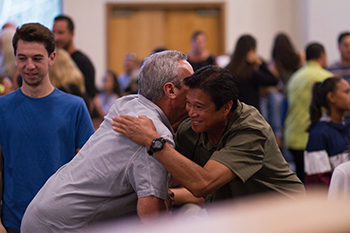“Therefore, the community must always be fully prepared in the pursuit of its apostolic vocation to give help to those who are searching for Christ” (RCIA Study Edition, #9).
 In 2020, 20,541 children under the age of seven, and 3,686 adults were welcomed into the Catholic Church in Australia through the sacrament of Baptism.[1] These statistics provide hope for the future of God’s family; however, they may also be a catalyst for us to ask some questions.
In 2020, 20,541 children under the age of seven, and 3,686 adults were welcomed into the Catholic Church in Australia through the sacrament of Baptism.[1] These statistics provide hope for the future of God’s family; however, they may also be a catalyst for us to ask some questions.
For example, whose responsibility is it to continue to nurture these new Catholics? Whose responsibility is the task of evangelisation so that people continue to come forward for Baptism? And whose responsibility is it to accompany enquirers through the initiation process and beyond?
The short answer is, if you are baptised, then you are responsible. As individuals, either ministering in your own circles of influence or in groups in your faith communities, the baptised are called to propose the Good News of Jesus, and to walk with others on their journey of faith, according to the gifts God has given.
This article looks at some ideas and strategies about how this might be done.
The invitation (evangelisation)
“Always be ready to make your defence to anyone who demands from you an accounting for the hope that is in you; yet do it with gentleness and reverence” (1 Peter 3:15-16 NRSVCE).
While some Catholics shy away from proposing their faith to others, there are ways it can be done gently and respectfully. For example:
- Share stories about how God, Jesus or the Catholic faith have positively impacted your life.
- In everyday conversations, mention if you have been to Mass or to a parish activity. This lets people know you are Catholic, and it might open the door to further conversations.
- Where appropriate, extend the invitation to come along to Mass or a parish event. Christmas and Easter are great opportunities to do this.
- Where appropriate, wear a cross or display a Christian symbol on your desk or in your car. This can be a conversation-starter about the faith.
When thinking about the above opportunities, consider the people in your network: family, friends, parents at your local school or children’s sporting events, social media contacts or work colleagues. As well, give some thought to the people you meet incidentally, for example, in waiting rooms and on public transport.
Action suggestions:
1. Do you have your own faith story (a testimony)? It doesn’t have to be grand. It could simply be how you have encountered God in a time of distress, joy or questioning.
2. If you don’t feel confident to tell your story, ask your parish priest or parish pastoral council to provide some formation in this area. A few simple tips might be all you need. Remember, you are cooperating with God in this work. So, propose the Good News, and then let God do God’s work.
The welcome
“Do not neglect to show hospitality to strangers, for by doing that some have entertained angels without knowing it” (Hebrews 13:2).
 Imagine for a moment if the person you propose Jesus or the Catholic faith to takes you up on your offer. What will your response be and what will you need the faith community to help with?
Imagine for a moment if the person you propose Jesus or the Catholic faith to takes you up on your offer. What will your response be and what will you need the faith community to help with?
Action suggestions:
1. As an individual, if someone you know has decided to take tentative steps towards becoming a Catholic, check in with them from time to time. Could you invite them to Mass? Continue to affirm them in what they are doing and be prepared to answer their questions.
2. Parishioners could prepare a welcome pack for enquirers. Include information about the parish and maybe a small gift, like a cross, a candle, a small book of prayers or an introduction to Jesus and the Catholic faith.
3. Develop a strategy for year-round RCIA; enquirers should always be welcome whenever they come knocking.[2]
4. Ensure your hospitality ministry is always on the lookout for “new people” coming to Mass. A warm welcome at the door of the church can settle the nerves of a person who might be feeling a bit tentative about coming to Mass.
5. Keep the welcome going – if the person becomes a Catholic, then follow them up on the anniversary of their Baptism with a card. Check in with them and ask if they are travelling okay.
The role of ministry groups
“You are the light of the world. A town built on a hill cannot be hidden. Neither do people light a lamp and put it under a bowl. Instead, they put it on its stand, and it gives light to everyone in the house” (Matthew 5:14-15).
No matter how small your parish, every ministry group has something to offer enquirers. The gifts of these people should not be hidden under a bowl.
Inviting your enquirers to “visit” parish ministry groups is valuable for at least two reasons. First, it allows enquirers to meet other Catholics in the parish so that when they go to Mass their sense of belonging will be strengthened. Such meetings can also impact the ministry group members as they are revitalised by the fact that people are interested in the Catholic faith. Second, it allows the enquirer to experience, first-hand, what Catholics “do”. They will no doubt have questions after visiting these groups, and these can be responded to in the formal RCIA gatherings.
Action suggestions:
1. Make an audit of what’s going on in your parish. Liaise with the ministry groups and the enquirers to work out the best time for them to connect. Ensure there is someone in the ministry group who will make them feel welcome and is prepared to answer any questions they might have.
2. Make an audit of what else is on offer outside your parish. Maybe the diocese offers retreats, prayer groups or special interest groups such as environmental care or social justice activities.
3. If you have any prayer groups in your parish, ask them to specifically pray for the enquirers; give them their names. Maybe they could meet for a cuppa so that they get to know each other.
The RCIA team
“For as in one body we have many members, and not all the members have the same function, so we, who are many, are one body in Christ, and individually we are members one of another. We have gifts that differ according to the grace given to us” (Romans 12:4-6).
One of the most frequent comments from RCIA team members is how the process can be both exhausting and life-giving at the same time. Some say that to accompany a person going through the conversion process and seeing them recognise God at work in their lives is a precious gift of this important ministry. It is no wonder that some parishioners find themselves wanting to stay on the RCIA team for many years.
Here are some ideas for a parish to consider.
Action suggestions:
1. Whether you have enquirers or not, be proactive in putting a team together. Ideally you need more than one person – mainly because no one person will have all the gifts you will need to serve potential enquirers.
2. Ascertain what extra formation is required, and who can provide it.
3. Work with the liturgy ministers so that the various rites will be celebrated beautifully.
4. Remember, the RCIA team doesn’t have to do “everything”.
Can the RCIA process transform a parish?
Thomas Morris wrote:
“An active initiation process keeps the winds of renewal always current in the parish.”[3]
When individuals take responsibility for sharing their faith, and the entire faith community gets involved in the accompaniment and ongoing journey of enquirers, the following transformation is likely to occur:
- There will be ongoing signs of new life in the community.
- Parishioners will be revitalised in their own faith by witnessing the conversion of others.
- The RCIA rituals will spiritually uplift parishioners and remind them of the fundamental aspects of their faith.
- Enquirers/catechumens and parishioners will grow in their faith by receiving ongoing access to faith formation.
- Leadership opportunities for the lay increase, enabling them to be more confident to evangelise and form disciples.
If this article has been helpful, please feel free to share it. Further RCIA resources are provided below.
Resources
Anslinger, Leisa. A Vision for Conversion: Eight steps to radically change your RCIA process. Minnesota, USA: Liturgical Press, 2018.
Congregation for Divine Worship. Rite of Christian Initiation: Study Edition. Strathfield, Australia: St Pauls Publications, 2018.
Macalintal, Diana. Your Parish is the Curriculum. Minnesota, USA: Liturgical Press, 2018.
Christian Initiation Australia Network
This article is the final part of a three-part series. The other two articles can be found here:
Part 1: The RCIA process in your parish
Part 2: Thinking about conversion in the RCIA process
Images: Unsplash: Erika Giraud; Lightstock.
Words: Sharon Brewer
[1] Catholic Church, Statistical Yearbook of the Church (Vatican: 2020), 335.
[2] TeamRCIA. How to start a year-round RCIA process.
[3] Thomas H. Morris. The RCIA: Transforming the Church (New York: Paulist Press, 1997), 11.



